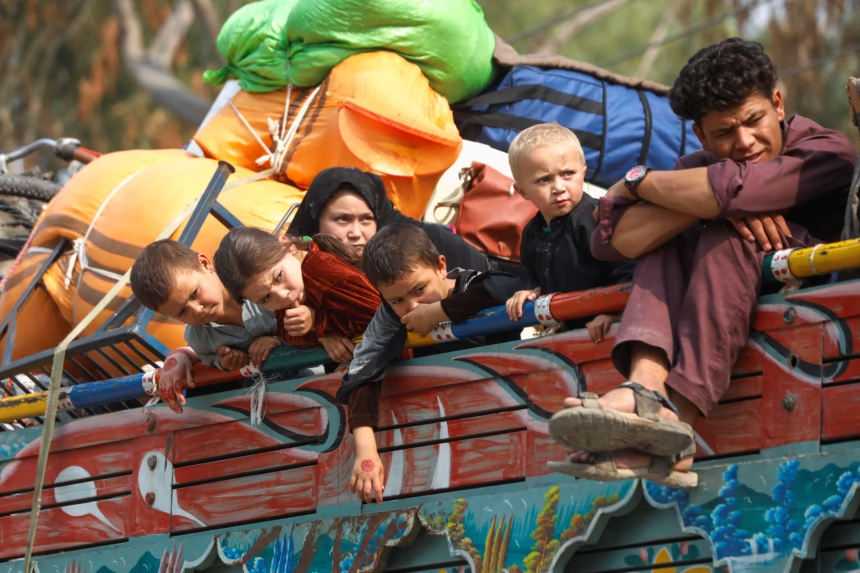PUBLISHED
August 24, 2025
PESHAWAR:
“My friends and I enrolled in science subjects at the matric level to become doctors or health practitioners after higher studies and serve humanity,” says Safia Babi, 15, a 9th-grade Afghan student in Pakistan, expressing her grievances over the recent government decision that Afghan refugees holding Proof of Registration (POR) cards must leave the country in September.
“But the decision has shattered our dreams, and now we feel hopeless.”
She added that due to the fear of repatriation to Afghanistan, she and her friends are concerned that they will not be able to continue their studies in Afghanistan amid the Taliban harsh polices for women and girls.
According a news shared by Radio Pakistan on August 5, the Interior Ministry has initiated the process of voluntary repatriation of Afghan nationals holding POR cards, with September 1 set as the starting date for formal deportations.
The decision was taken during a high-level meeting held under the ongoing Illegal Foreigners Repatriation Plan (IFRP), citing security concerns and the increasing strain on national resources.
The announcement has widely spread concern and tension among Afghan nationals who have been living in Pakistan with legal documents for more than four decades.
Abdul Baqi Salarzai, who lost his leg while clearing landmines in Afghanistan, is also among those who have spent their days and nights in Jalala refugee village in Mardan district of Khyber Pakhtunkhwa (KP), striving for the bright future of their children.
Salarzai said that he does not fear lacking shelter, financial support, or other facilities in Afghanistan, but the thought of girls being prevented from getting education and women being denied the right to work is his major worry.
“I have six daughters who are studying in the 6th, 7th, and 9th grades at a government-run local school here, shares Salarzai. “My son is also enrolled in school. If we are forced to leave Pakistan, then because of the ban on girls’ education, my daughters will not be able to continue their studies in Afghanistan, which leaves us all in despair for their future.”
Since the Taliban’s return to power on August 15, 2021, following the withdrawal of US and NATO forces, the regime has steadily rolled back women’s rights.
In September 2021, girls were barred from attending school beyond the sixth grade. Later, universities were declared off-limits to women, followed by a ban on female enrollment in medical training institutions and employment in both public institutions and NGOs.
The Taliban have justified these bans by citing their interpretation of Islamic law, a claim widely disputed by Islamic scholars across the Muslim world.
According to data obtained from the United Nations High Commissioner for Refugees (UNHCR), 54 refugee villages have been established, of which 43 are in KP, one in Punjab, and 10 in Balochistan.
The data shows that more than 1.3 million POR card holders, about 750,000 Afghan Citizen Card (ACC) holders, and, after the fall of Kabul, around 600,000 Afghans entered Pakistan, of which 225,000 still reside in the country.
Pakistan launched the Illegal Foreigners Repatriation Plan in November 2023, initially targeting undocumented immigrants and Afghan Citizen Card holders.
According to Associated Press of Pakistan (APP) the National Assembly has been informed that approximately 1.3 million Afghan refugees have been repatriated from Pakistan so far.
Qaisar Khan Afridi, spokesperson for UNHCR, confirms that the organisation had sought an extension of POR cards, as a large number of Afghan students are enrolled here, while some Afghan nationals have Pakistani spouses. A number of traders have businesses in Pakistan and winding them up in such a short span of time is impossible for them.
“We are negotiating with the government to extend the stay of Afghan refugees in Pakistan and to support them just like they were supported during the last 45 years,” he shares. “We are also advocating that the government should adopt an approach in which the repatriation process is voluntary, dignified, and safe.”
A UN report shared on August 8, stated that since September 2023, more than 2.4 million undocumented Afghan migrants have returned, or were forced to return, from Pakistan and Iran.
In the report it is emphasised that the international community must provide greater support to Afghan women and girl returnees from Iran and Pakistan who face increased risk of impoverishment, early marriage and growing threats to their rights and safety.
“POR card holders are registered Afghan refugees and the sudden decision for their repatriation has resulted in widespread anxiety and depression among documented Afghan refugees,” says Muska Safi, a Peshawar-based Afghan female journalist. “I am the sole breadwinner for my family, so how can I suddenly leave the country where I grew up and got education till higher studies? Since the Pakistani government’s decision, I am devastated with severe stress.”
She explained that Afghan women work in the media, arts, acting, as well as being doctors, beauticians, singers, and musicians. There are even transgender individuals who face threats if they are returned to their homeland. The Amnesty International and other international organisations have already warned that Afghanistan is not a safe place for them.
Safi has requested the Government of Pakistan to revise its plan for repatriation of Afghan national and not to expel those who already have legal documents.
Another Afghan national from Jalala refugee village, Abdullah Ahmadzai* said that his elder brother had worked with the previous Afghan government, and they could not return to a country where former government employees are detained and tortured.
He urged the Pakistani government and the international community to expedite the third-country resettlement process for those who might have to deal with threats in Afghanistan.
On condition of anonymity due to security reasons, a Kabul-based female journalist shared that, although camps have been established in the Jalalabad area of Nangarhar province and along the Spin Boldak and Chaman borders of Kandahar province to facilitate Afghans returning from Pakistan, there are no specific or separate health and other facilities for women and children which are more important and crucial.
She added that after returning to power, the Taliban authorities announced a general amnesty, but most of those who continue to fight for human rights and raise their voices against the Taliban harsh policies are still detained and tortured.
Jamal Safi*, an Afghanistan-based humanitarian aid worker said that, in the current situation of Afghanistan, the mass repatriation of Afghan refugees from Pakistan would multiply the problems of those who returned home.
He mentioned that along with issues related to girls’ education, they would also face financial, food, and health challenges, as these sectors are already suffering from shortage of funds.
For a long-term solution, he suggested that the Taliban government must devise a proper mechanism for financial assistance, the construction of permanent shelters, and the provision of proper food and healthcare, especially for children and pregnant women.
He added that it is also crucial for the international community to convince Pakistani authorities to carry out the repatriation process in coordination with the Taliban government.
To obtain comments about facilitation for Afghan returnees departing from Pakistan and their concerns, the Express Tribune tried to take comments of Abdul Mutalib Haqqani, spokesman for Taliban’s refugee ministry and Hamdullah Fitrat, Taliban government’s deputy spokesperson, but they did not respond to Whatsapp calls and messages.
*Names changed for privacy
Abdur Razzaq is a Peshawar-based multimedia journalist. He tweets @TheAbdurRazzaq
All facts and information are the sole responsibility of the writer









